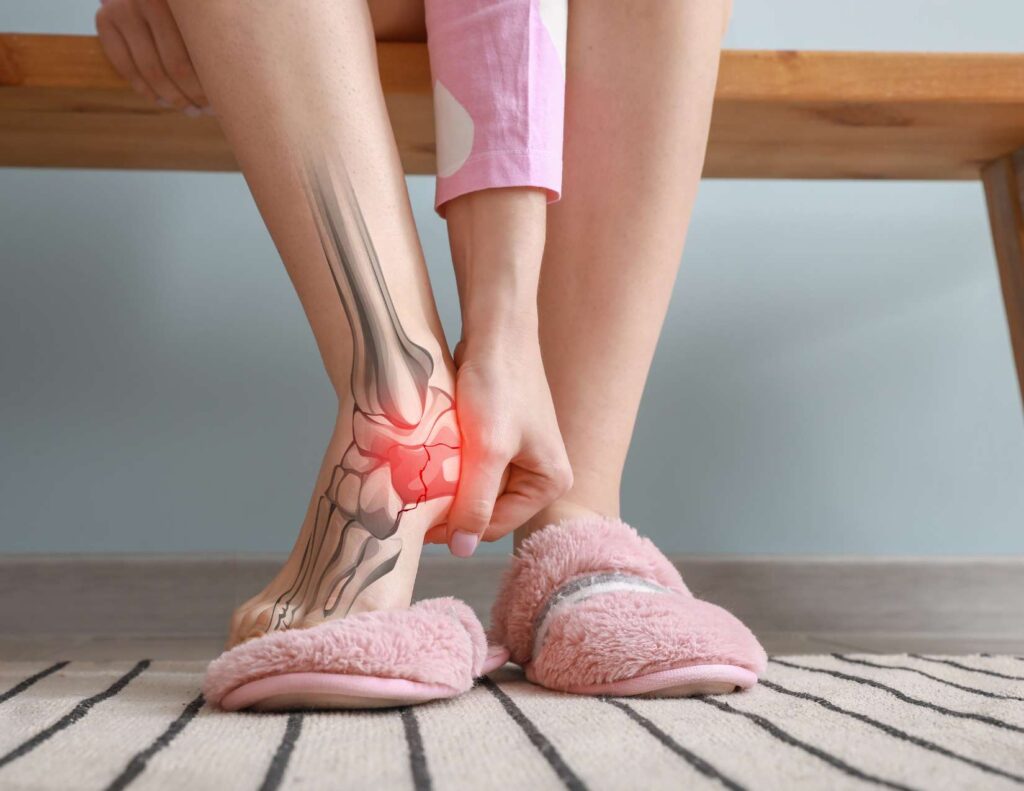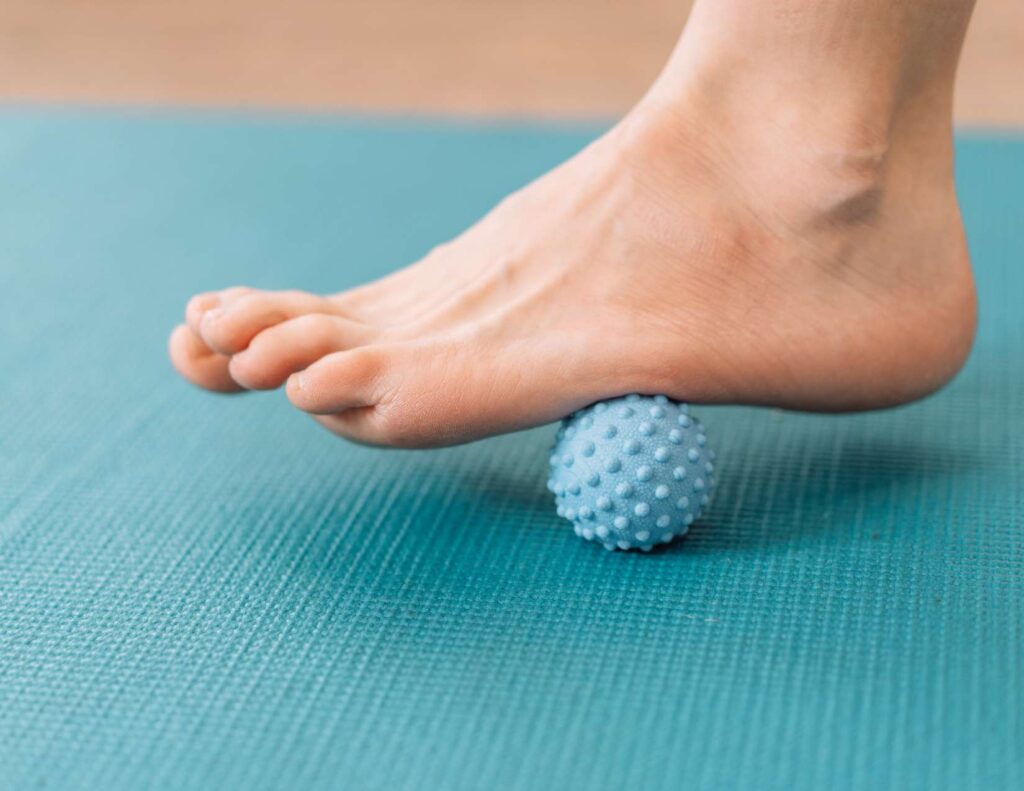Unlocking the Link: Can Plantar Fasciitis Cause Knee Pain?
Are you battling with persistent pain associated with plantar fasciitis and now noticing an unusual sting in your knee? You might wonder, can plantar fasciitis cause knee pain? Let’s delve into this intriguing connection of health conditions. It seems very likely that Plantar fasciitis, a common cause of heel pain, can indeed contribute to knee discomfort. This may seem surprising, but when you consider the interconnected nature of the body’s musculoskeletal system, it begins to make sense. The foot’s weaknesses can trigger a ripple effect throughout your body, affecting your gait and putting extra stress on your knees.
Here, we’ll explore the link between plantar fasciitis and knee pain, dissecting the science behind it, and offering practical solutions to alleviate your pain. So, let’s step into the world of foot and knee health, and tread the path to a pain-free life!
Table of Contents

Introduction to plantar fasciitis and knee pain
Plantar fasciitis and knee pain are two common ailments that can significantly impact our daily lives. Plantar fasciitis refers to the inflammation of the plantar fascia, a thick band of tissue on the bottom of the foot that connects the heel bone to the toes. On the other hand, knee pain can arise from various causes such as injury, arthritis, or overuse. While these two conditions may seem unrelated, recent research suggests that there may be a connection between plantar fasciitis and knee pain. In this article, we will delve into the intricate relationship between these two conditions and explore the potential causes, symptoms, diagnosis, treatment, and prevention methods.
Understanding plantar fasciitis
Plantar fasciitis is a common foot condition that affects the plantar fascia, causing pain and discomfort in the heel and arch of your foot. The plantar fascia plays a crucial role in supporting the arch of the foot and absorbing shock during walking or running. When this band of tissue becomes inflamed or strained, it can lead to intense heel pain, especially during the first steps in the morning or after prolonged periods of rest.
The primary cause of plantar fasciitis pain is excessive or repetitive strain on the plantar fascia. This can occur due to other risk factors such as overuse, wearing improper footwear, having flat feet or high arches, or being overweight. The condition is often seen in athletes, individuals who spend a long time on their feet, or those with structural abnormalities in their feet. Pregnancy related heel pain and foot pain after pregnancy are also very common and can lead to plantar fasciitis.
Understanding knee pain
Knee pain is a prevalent complaint that can arise from various underlying causes. The knee joint is a complex structure consisting of bones, cartilage, ligaments, tendons, and muscles. Any disruption or injury to these components can result in pain and limited mobility. Common causes of knee pain include ligament tears, meniscal injuries, osteoarthritis, tendonitis, and bursitis.
The symptoms of knee pain can vary depending on the specific cause. Patients may experience sharp pain, swelling, stiffness, instability, or difficulty bearing weight on the affected knee. Knee pain can significantly impact an individual’s ability to perform daily activities, exercise, or participate in sports. The pain can also lead to an altered gait or hobbling which can cause hip pain, low back pain and sciatica issues.
The relationship between plantar fasciitis and knee pain
While the foot and knee may seem like distinct body parts, they are interconnected through a complex network of muscles, tendons, and ligaments. Research suggests that there may be a link between plantar fasciitis and knee pain, although the exact mechanism is not yet fully understood.
One possible explanation for the connection is the concept of compensatory movements. When an individual experiences foot pain due to plantar fasciitis, they may subconsciously alter their gait or posture to alleviate discomfort. These compensatory movements can lead to changes in the alignment and mechanics of the knee joint, potentially causing stress and inflammation in the knee.
Research and studies on the connection
Several studies have explored the relationship between plantar fasciitis and knee pain. A study published in the Journal of Orthopedic & Sports Physical Therapy found that individuals with plantar fasciitis were more likely to have knee pain compared to those without plantar fasciitis. The study also discovered that individuals with knee pain had significantly reduced foot and ankle mobility, suggesting a potential connection between the two conditions.
Additionally, studies have found that individuals with plantar fasciitis often exhibit altered biomechanics in the lower limb. These abnormal movement patterns can place undue stress on the knee joint, contributing to the development of knee pain.
While these studies provide valuable insights into the connection between plantar fasciitis and knee pain, further research is needed to establish a definitive cause-and-effect relationship and to determine the most effective treatment approaches.

Common symptoms of plantar fasciitis and knee pain
Both plantar fasciitis and knee pain can cause significant discomfort and limit an individual’s ability to perform regular activities. Understanding the common symptoms associated with these conditions can help with early identification and appropriate treatment.
Common symptoms of plantar fasciitis include:
- Intense pain in the heel or arch of your foot, especially during the first few steps in the morning or after periods of rest.
- Increased pain with long periods of standing, walking, or physical activity.
- Stiffness or limited range of motion in the foot.
- Tenderness or swelling in the affected area.
- Pain that worsens over time if left untreated.
Common symptoms of knee pain include:
- Pain, tenderness, or swelling around the knee joint.
- Difficulty bearing weight on the affected knee.
- Stiffness or limited range of motion.
- Instability or a sensation of the knee “giving way.”
- Clicking or popping sounds during movement.
Diagnosing plantar fasciitis and knee pain
Accurate diagnosis is crucial for effective treatment of both plantar fasciitis and knee pain. A healthcare professional will typically perform a thorough physical exam and may order additional tests to confirm the diagnosis.
For plantar fasciitis, the healthcare provider may:
- Assess the patient’s medical history and inquire about symptoms.
- Conduct a physical examination, including checking for tenderness, swelling, or abnormal foot mechanics.
- Order imaging tests such as X-rays or ultrasounds to rule out other potential causes such as heel spurs, bone spurs or stress fractures.
For knee pain, the healthcare provider may:
- Evaluate the patient’s medical history and discuss symptoms in detail.
- Perform a physical examination, including assessing the range of motion, stability, and tenderness of the knee.
- Recommend imaging tests such as X-rays, MRI, or CT scans to assess the internal structures of the knee joint.
Treating plantar fasciitis and knee pain
Once diagnosed, proper treatment for plantar fasciitis and knee pain will depend on the severity of the condition and the individual’s specific needs. In most cases, a combination of conservative measures is employed to alleviate pain, promote healing, and restore function.
Treatment options for plantar fasciitis may include:
- Proper rest and reduced weight-bearing activities to relieve stress on the bottom of your foot.
- Ice therapy to reduce pain and inflammation.
- Stretching and strengthening exercises for the foot and calf muscles.
- Wearing custom orthotics, arch supports or shoe inserts can provide support and correct abnormal foot mechanics.
- Nonsteroidal anti-inflammatory drugs (NSAIDs) to reduce pain and inflammation.
Treatment options for knee pain may include:
- Rest and avoiding activities that exacerbate the pain.
- A Physical Therapist can prescribe exercises to improve strength, flexibility, and stability.
- Pain-relieving medications such as NSAIDs or corticosteroid injections.
- Assistive devices like night splints, braces or crutches to support the knee during healing.
- In extreme cases, surgical intervention may be necessary to repair damaged structures or replace the joint.

Preventing plantar fasciitis and knee pain
Prevention plays a crucial role in reducing the risk of developing plantar fasciitis and knee pain. First thing, by adopting certain lifestyle modifications and implementing good practices, individuals can minimize the chances of these conditions occurring.
To prevent plantar fasciitis:
- Wear supportive shoes that provides adequate arch support and cushioning that can act as a shock absorber.
- Gradually increase the intensity and duration of physical activities to avoid overuse injuries.
- Maintain a healthy weight to minimize stress on the feet.
- Perform regular stretching exercises for the feet and calves.
- Avoid walking or running on hard surfaces for extended periods.
- Take supplements for plantar fasciitis that decrease inflammation, such as turmeric, omega-3 fatty acids and glucosamine.
To prevent knee pain:
- Engage in regular exercise to strengthen the muscles supporting the knees.
- Warm up adequately before physical activities and cool down afterward.
- Use proper form and technique during exercise or sports to minimize stress on the knees.
- Avoid sudden increases in intensity or duration of physical activities.
- Listen to your body and rest when necessary to avoid overuse injuries.
Conclusion and final thoughts – Can plantar fasciitis cause Knee Pain?
In conclusion, it seems likely due to their connection, with plantar fasciitis potentially contributing to knee pain through altered biomechanics and compensatory movements. While further research is needed to establish a definitive cause-and-effect relationship, the existing studies suggest a strong association between these two conditions.
If you are experiencing symptoms of plantar fasciitis or knee pain, it is essential to seek professional medical advice for an accurate diagnosis and appropriate treatment. Early intervention and proper management are crucial in preventing the progression of these conditions and minimizing their impact on your daily life.
Remember, prevention is always better than trying to find a cure. By adopting healthy lifestyle habits, wearing appropriate footwear, and listening to your body, you can reduce the risk of developing plantar fasciitis and knee pain and maintain optimal foot and knee health.
Stay proactive, take care of your feet and knees, and prioritize your overall well-being!







